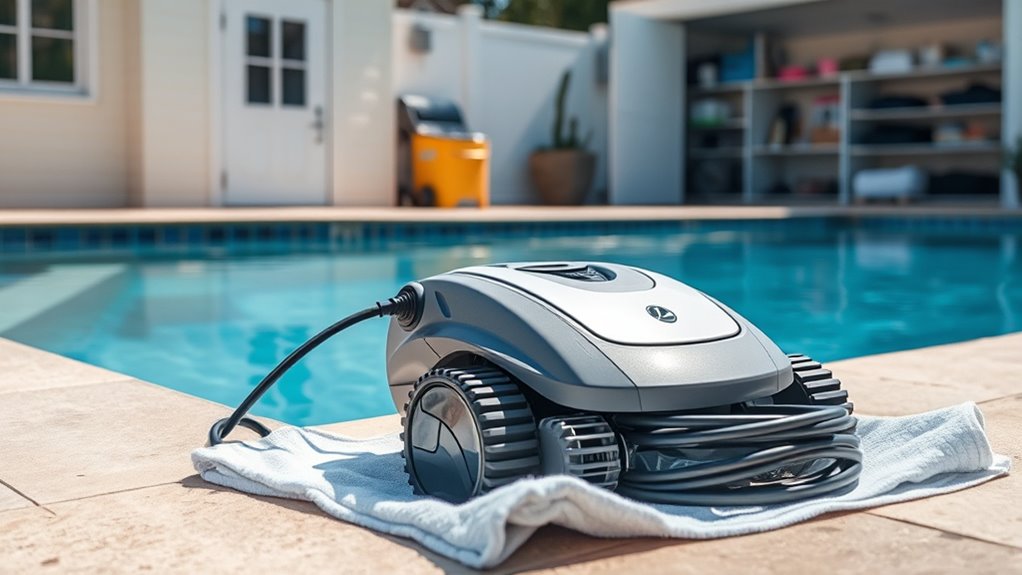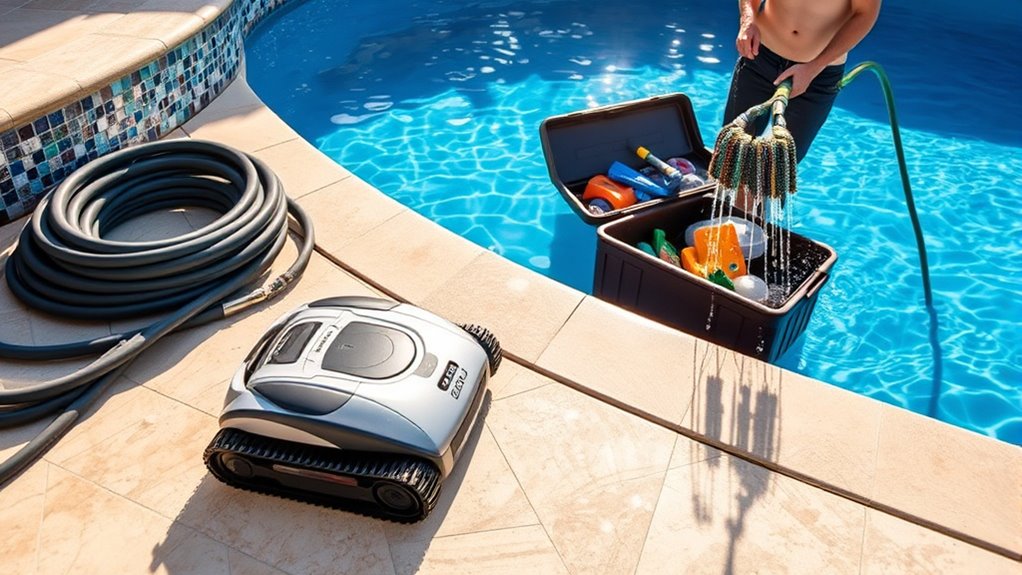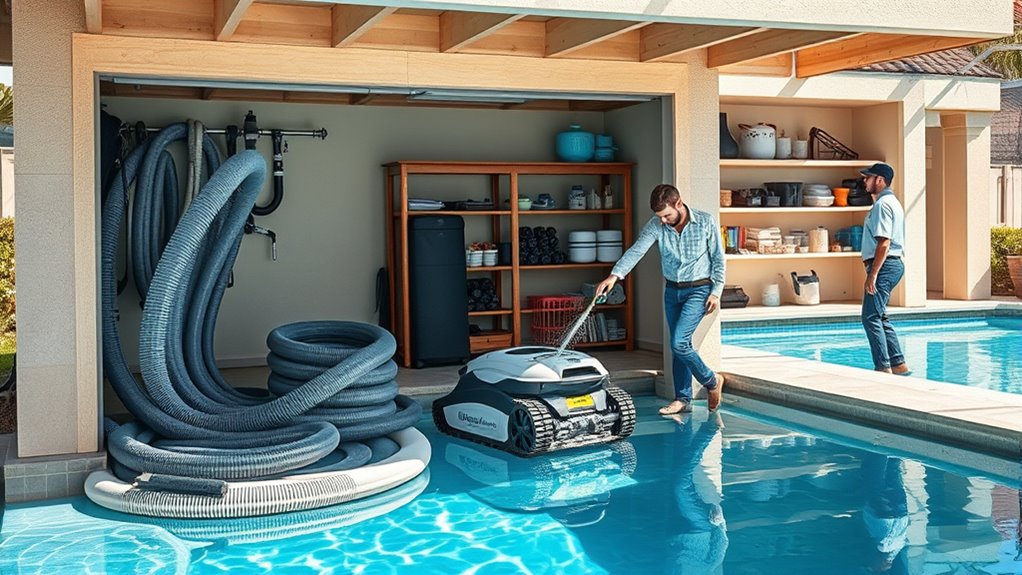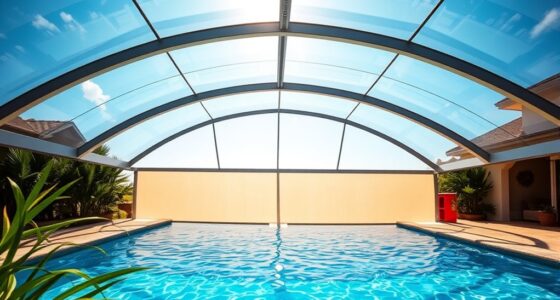To keep your automatic pool cleaner in top shape, regularly remove debris, rinse it thoroughly, and dry all parts after use. When storing it off-season, clean and disconnect all components, dry them completely, and store in a cool, dry place away from direct sunlight. Prevent issues by inspecting brushes and filters regularly and maintaining proper pool chemistry. Continue exploring to discover detailed tips for cleaning, storing, and extending your cleaner’s lifespan.
Key Takeaways
- Regularly remove debris and rinse the cleaner with a hose, focusing on brushes, filters, and wheels.
- Clean and dry all parts thoroughly before storage, avoiding moisture to prevent mold and corrosion.
- Store in a cool, dry location away from sunlight, loosely coiling cords and using protective covers if available.
- Inspect and replace worn brushes, damaged hoses, or filters to maintain optimal cleaning performance.
- Maintain consistent pool water chemistry and water levels to prevent damage and ensure efficient operation.
How to Properly Clean Your Automatic Pool Cleaner

To keep your automatic pool cleaner functioning effectively, it’s essential to clean it regularly. Start by inspecting the cleaner for leaf debris removal, removing any leaves, twigs, or dirt lodged in its brushes or filters. This prevents clogs and guarantees peak performance. Next, check the pool’s chemical balance; improper pH or chlorine levels can cause algae or scaling that may stick to the cleaner’s components. Rinse the cleaner with a hose to remove any remaining dirt and debris, paying close attention to brushes, wheels, and filters. Avoid harsh chemicals that could damage parts. Regular cleaning not only improves cleaning efficiency but also extends your cleaner’s lifespan. Incorporate routine checks to keep your pool cleaner in top shape and ready for your next swim. Monitoring suction power can help ensure your cleaner maintains optimal performance over time, especially since the contrast ratio of your pool environment can influence visibility and overall cleanliness. Additionally, inspecting filter components regularly can prevent malfunctions and improve filtration efficacy. Performing periodic cleaning of brushes and filters can help remove mineral buildup and other residues that may impair cleaning ability. To further enhance the longevity of your cleaner, consider storing it in a dry, shaded area when not in use to protect it from environmental wear.
Best Practices for Maintaining Your Pool Cleaner’s Components

Maintaining your pool cleaner’s components is essential for ensuring peak performance and longevity. Keep an eye on your pool chemistry, as proper chemical levels prevent buildup and corrosion on parts. Regularly check and clean the filter, as a clogged filter reduces suction and cleaning efficiency. During filter maintenance, remove debris and rinse the filter elements thoroughly to prevent blockages. Inspect hoses, brushes, and wheels for wear and damage, replacing parts as needed. Properly storing your cleaner after each use also helps preserve its components. Additionally, considering heat pump efficiency like regular chimney cleaning and proper installation can serve as a reminder of the importance of essential oil safety and regular maintenance for optimal vehicle performance. Embracing a consistent maintenance routine, including attention to detail, can significantly extend the lifespan of your pool cleaner and keep it operating smoothly every time you need it. By staying on top of pool chemistry and performing routine filter maintenance, you extend your cleaner’s lifespan and ensure it operates smoothly every time you need it.
Step-by-Step Guide to Storing Your Pool Cleaner During Off-Season

Properly storing your pool cleaner during the off-season helps prevent damage and keeps it ready for use when swimming resumes. Start by cleaning the device thoroughly, removing debris and rinsing off any dirt. Check that the pool’s water chemistry is balanced, focusing on proper chemical balancing to prevent corrosion or mold growth during storage. Before storing, disconnect and dry all parts to avoid mold or mildew. Store the cleaner in a cool, dry place away from direct sunlight to prevent material degradation. Ensure the power cord is loosely coiled to avoid damage. Remember, maintaining pool safety means keeping the cleaner in good condition, so it functions properly when needed. Additionally, considering advances in automation technologies can help streamline the maintenance process of pool equipment. Utilizing advanced diagnostic tools can further assist in identifying potential issues before storage. Regularly inspecting your equipment and performing routine maintenance can extend its lifespan and ensure optimal performance when you’re ready to swim again. Incorporating proper storage techniques can significantly contribute to the longevity of your pool cleaner. Employing these preventive measures can help avoid costly repairs and replacements. Following these steps will extend your cleaner’s lifespan and ensure it’s ready for your next swim season.
Tips for Preventing Common Issues and Extending Your Cleaner’s Lifespan

Regularly inspecting your automatic pool cleaner can help catch issues early before they cause costly damage. Check for signs of wear, tears, or obstructions that might hinder debris removal. Maintaining proper pool chemistry is essential; imbalanced water can cause buildup or corrosion, reducing your cleaner’s lifespan. Understanding the effects of water chemistry on your cleaner can help you make informed adjustments to optimize its performance. Clear out debris from the cleaner’s brushes, filters, and brushes frequently to prevent clogs and guarantee peak operation. Additionally, confirm your pool’s water level stays consistent, as low water can strain the cleaner’s components. Regular inspections and maintenance help you identify problems early, extend your cleaner’s lifespan, and keep it running smoothly. By keeping debris removal efficient and maintaining balanced pool chemistry, you reduce the risk of breakdowns and prolong the life of your automatic pool cleaner. Proper pool chemistry ensures that your cleaner operates in an environment that minimizes corrosion and buildup, further enhancing its durability. Regularly checking your filter system can also prevent debris from circulating improperly and causing issues. Monitoring water chemistry levels helps avoid conditions that could accelerate wear on your cleaner’s parts.
Troubleshooting Common Cleaning and Storage Concerns

When your automatic pool cleaner isn’t performing as it should, troubleshooting can quickly identify the root of the problem and save you time and money. Start by checking the filter; if it’s clogged or dirty, your cleaner’s suction and overall effectiveness decline. Regular filter maintenance guarantees ideal operation. If cleaning doesn’t improve performance, inspect the brushes. Worn or damaged brushes hinder debris removal, so consider brush replacement to restore cleaning efficiency. Also, verify that the cleaner’s brushes are spinning freely and aren’t tangled or obstructed. Sometimes, simple adjustments like cleaning the filter or replacing worn brushes resolve the issue. Proper storage practices and routine maintenance help prevent future concerns, but addressing these common problems quickly keeps your cleaner running smoothly. Additionally, understanding routine maintenance best practices can extend the lifespan of your pool cleaner and ensure consistent performance. To further improve longevity, keeping an eye on manufacturer recommendations can help you stay ahead of potential issues. Performing regular inspections and cleaning according to tuning guidelines can also enhance the overall efficiency of your pool equipment. Incorporating proper storage techniques, such as rinsing and drying the cleaner after use, can prevent corrosion and damage over time. Additionally, being aware of glycolic acid benefits for skin can be useful if you’re considering skincare that complements your pool maintenance routine.
Frequently Asked Questions
How Often Should I Replace Parts on My Automatic Pool Cleaner?
You should follow a regular replacement schedule based on the part lifespan to keep your automatic pool cleaner working effectively. Typically, brushes and hoses need replacing every 6 to 12 months, while filters may last up to a year. Keep an eye on wear and tear, and replace parts sooner if they show signs of damage. Regular maintenance ensures peak performance and extends the life of your cleaner.
Can I Use Chemical Cleaners to Disinfect My Pool Cleaner?
Your pool cleaner is the heart of your sparkling oasis, so you want it spotless! Using chemical disinfectants can seem like a quick fix, but not all cleaning agents are safe for your device. Some chemicals might damage it or cause deterioration over time. Always check the manufacturer’s instructions before using any chemical disinfectants, and opt for gentle, pool-safe cleaning agents to keep your cleaner in top shape.
Is It Safe to Store My Cleaner Outdoors During Winter?
Storing your pool cleaner outdoors during winter isn’t ideal unless you take proper winter protection measures. Exposure to cold, moisture, and the elements can damage your cleaner. To keep it safe, guarantee you have outdoor storage that provides shelter and protection from snow and rain. Consider using a weatherproof cover or storing it in a shed. Proper outdoor storage with winter protection helps prolong your cleaner’s lifespan and keeps it ready for next season.
What Are Signs My Cleaner Needs Professional Repair?
Imagine your pool cleaner as a diligent worker whose energy suddenly falters. If it stops moving, makes strange noises, or leaves debris behind, it’s time for manual troubleshooting. You might notice persistent issues despite simple fixes. If problems persist, check if your warranty coverage applies. When doubt remains, consult a professional to prevent further damage, ensuring your cleaner stays in top shape for all your swimming adventures.
How Do I Prevent Algae Buildup in My Pool Cleaner?
To prevent algae buildup in your pool cleaner, focus on algae prevention by regularly inspecting and cleaning the device. Proper cleaner maintenance includes rinsing it after use and storing it in a dry, shaded area to avoid moisture buildup. Keep your pool’s chemical balance in check, especially sanitizer levels, to reduce algae growth. Consistent maintenance and attention to water quality help guarantee your cleaner stays efficient and algae-free.
Conclusion
Don’t let storage worries keep you from enjoying your pool cleaner’s benefits. Proper cleaning and storage guarantee its lifespan and ensure it’s ready to go whenever you need it. Even if you think it’s too much hassle, investing just a little time now saves you money later on repairs or replacements. With these simple tips, you’ll keep your cleaner in top shape year-round—so you can relax and enjoy crystal-clear waters anytime.









